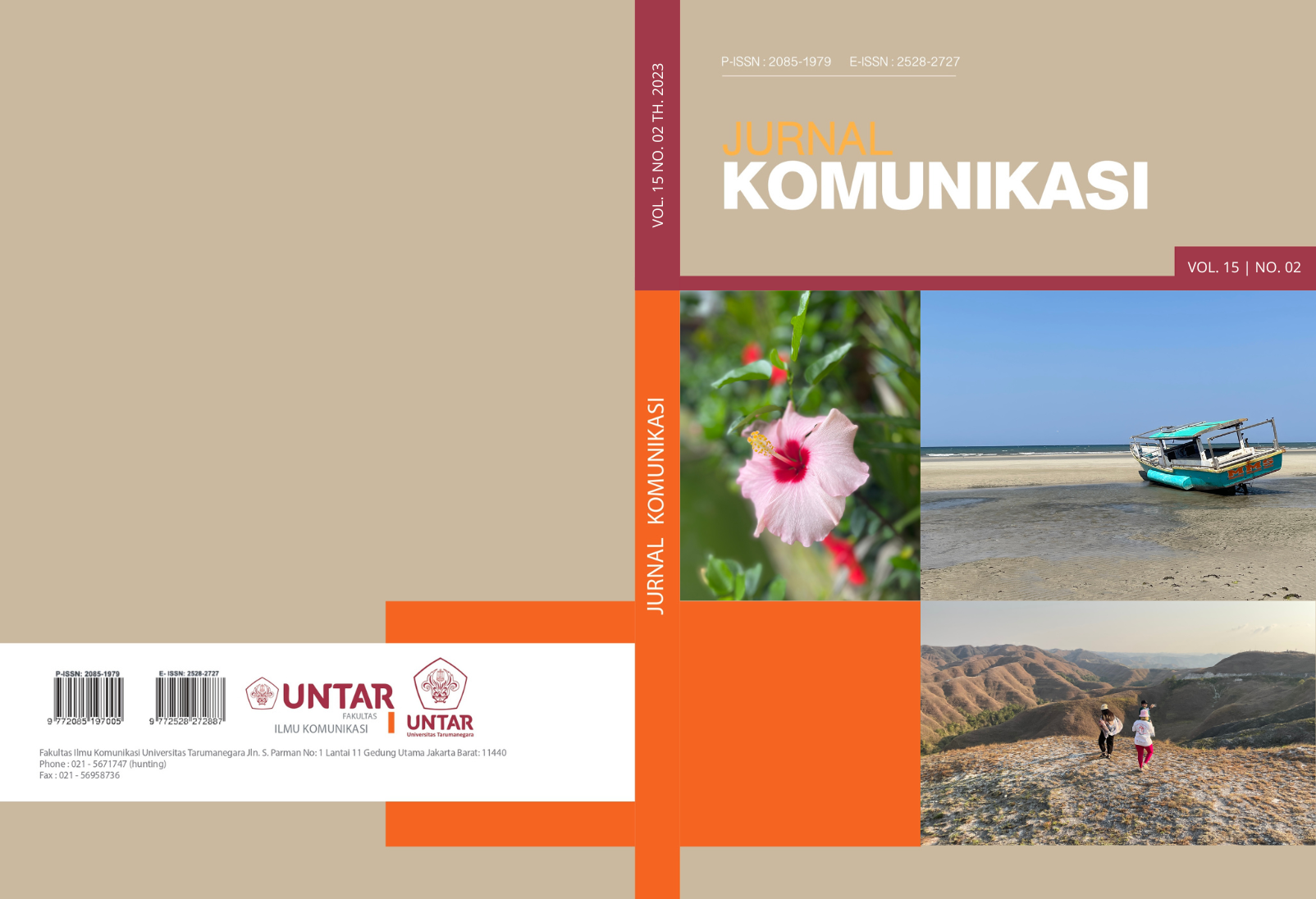Hate Speech Through Identity Politics On Social Media Ahead Of The 2024 Presidential Election
Main Article Content
Abstract
The debate surrounding the 2024 General Election in the virtual space, such as social media, has led netizens to exchange hate speech and heavy criticism regarding their respective support. Two groups have emerged: government supporters highlighting the successes of President Joko Widodo and those shifting their support to Anies Baswedan after Prabowo joined the government. Over time, this phenomenon has led to the proliferation of hate speech based on identities such as religion, ethnicity, and fanatical groups, potentially dividing public opinion. This study aims to explain the emergence of hate speech and the forms of hate speech based on identity politics leading up to the 2024 General Election. This study employs virtual ethnographic analysis (Virtual Ethnography) to observe tweets or statuses on selected accounts and the comments that arise from those tweets. The objects of analysis are the trends of words and phrases and the content within observed sentences or paragraphs. The research findings have been presented in the form of tabulation and categorization. The results show that comments and statuses containing hate speech always create bidirectional and multi-directional communication models among users. Hate speech often uses phrases and keywords that lead to insults, malicious accusations, curses, and accusing the opposing party of being stupid and evil. Based on this study, social media users must realize that the presidential campaign is a time to have different choices but remain aware of the same nation. Users need to develop an awareness of social media ethics. Enforcing rules against those who spread hate speech is key for every actor involved.
Article Details
Section

This work is licensed under a Creative Commons Attribution-ShareAlike 4.0 International License.
This work is licensed under a Jurnal Komunikasi Creative Commons Attribution-ShareAlike 4.0 International License.How to Cite
References
Amin, K., Alfarauqi, M. D. A., & Khatimal, K. (2018). Social media, cyber hate, and racism. Komuniti: Jurnal Komunikasi Dan Teknologi Informasi, 10(1), 3–13. http://journals.ums.ac.id/index.php/komuniti/article/view/5613
Anggraeny, K. D. (2017). Penafsiran tindak pidana penodaan agama dalam perspektif hukum. Era Hukum, 2(1), 267–293. https://media.neliti.com/media/publications/217569-none.pdf
Bajari, A. (2013). Three C’S on elevision and internet. https://doi.org/10.5176/2301-3710
Bajari, A. (2017). Language provocation on football fanatic fans (Study of virtual Communication Ethnography on Facebook of Football Fans Club in Indonesia). Proceedings of the 3rd World Conference on Media and Mass Communicatio, 2, 1–12. https://pingpdf.com/queue/pdf-language-provocation-on-football-fanatic-fans-study-of-virtual-.html
Bajari, A. (2020, April 8). Penyakit komunikasi. Pikiran Rakyat.
Bajari, A., Koswara, I., & Erlandia, D. R. (2019). Struktur pesan ujaran kebencian (hate speech) dalam facebook selama kampanye dan pascakampanye pemilihan presiden (pilpres) 2019 (1; 1).
Bajari, A., Koswara, I., & Erlandia, D. R. (2021). Hatenography: an analysis of hate speech on Facebook in 2019 Indonesian presidential campaign. Jurnal Komunikasi: Malaysian Journal of Communication, 37(4), 122–141. https://doi.org/10.17576/JKMJC-2021-3704-08
Bajari, A., & Kuswarno, E. (2020). Violent language in the environment of street children singer-beggars. Heliyon, 6(February), e04664. https://doi.org/10.1016/j.heliyon.2020.e04664
Bajari, A., Koswara, I., Istiqomah, R. N., & Erlandia, D. R. (2021). Hatenography On Twitter during the Covid-19 pandemic in Indonesia: hate speech case against Anies Baswedan. Review of International Geographical Education Online, 11(5), 68–78. https://doi.org/10.48047/rigeo.11.05.07
Bajari, A., Suryana, A., Wahyudin, U., & Mulyana, S. (2022). Pelatihan Peningkatan Literasi Media Sosial Untuk Mereduksi Ujaran Kebencian Berbasiss Kelompok Generasi Muda Dan Sekolah Di Kabupaten Pangandaran. Jurnal Kajian Budaya Dan Humaniora, 4(3), 287–293. https://doi.org/10.61296/jkbh.v4i3.59
Bojarska, K. (2015). The dynamics of hate speech and counter speech in the social media. https://cihr.eu/wp-content/uploads/2018/10/The-dynamics-of-hate-speech-and-counter-speech-in-the-social-media_English-1.pdf
CNN Indonesia. (2019). Pilpres 2019, hoaks dan ujaran kebencian masih akan berlanjut. CNN Indonesia, 1–5. https://www.cnnindonesia.com/teknologi/20180811164559-185-321516/pilpres-2019-hoaks-dan-ujaran-kebencian-masih-akan-berlanjut
Coliver, S., Boyle, K., & D’Souza, F. (1992). Striking balance. Hate speech, freedoom expression and non-dscrimination. In Human Rights Centre, University of Essex. Article 19, International Centre Aginst Censorship Human Right Centre, University of Essex. https://www.article19.org/data/files/pdfs/publications/striking-a-balance.pdf
Dalgliesh, B. (2013). Problematising the political theory of identity politics: towards an agonistic freedom. Kritike: An Online Journal of Philosophy, 7(1), 69–95. https://doi.org/10.25138/7.1.a.5
Fikri, D. A. (2019, September 26). Pesan negatif di media sosial makin tinggi , ini penyebabnya! Okezone.Com, September 2019, 1–9. https://lifestyle.okezone.com/read/2019/09/26/196/2109675/pesan-negatif-di-media-sosial-makin-tinggi-ini-penyebabnya
Goldberg, A. (2015). Hate speech and identity politics in Germany, 1848-1914. JSTOR, 48(4), 1–4. https://www.cambridge.org/core/journals/central-european-history/article/hate-speech-and-identity-politics-in-germany-18481914/A760AD6161464195C4FAC6E914AEAF98
Juditha, C. (2017a). Hatespeech di media online: Kasus Pilkada DKI Jakarta 2017. Jurnal Penelitian Komunikasi Dan Opini Publik, 1(1), 138–151. https://doi.org/http://dx.doi.org/10.33299/jpkop.21.2.1134
Juditha, C. (2017b). Memahami struktur jaringan media sosial sebagai cara strategis periklanan di era ekonomi digital. Jurnal Pekomas, 2(1), 99–114. https://media.neliti.com/media/publications/222416-none-5e53dea9.pdf
Kominfo. (2018). Memaksimalkan Penggunaan Media Sosial dalam Lembaga Pemerinbtahan. Kominfo. https://www.researchgate.net/publication/304690726_Harm_Principle_Offence_Principle_and_Hate_Speech
Kominfo. (2021, April 26). Sejak 2018, Kominfo tangani 3.640 ujaran kebencian berbasis SARA di ruang digital. 143, 1–6. https://www.kominfo.go.id/content/detail/34136/siaran-pers-no-143hmkominfo042021-tentang-sejak-2018-kominfo-tangani-3640-ujaran-kebencian-berbasis-sara-di-ruang-digital/0/siaran_pers
Malmasi, S., & Zampieri, M. (2017). Detecting hates speech in social media (Issue December 2017). https://doi.org/10.26615/978-954-452-049-6_062
Mondal, M., Silva, L. A., & Benevenuto, F. (2017). A measurement study of hate speech in social media. Proceedings of the 28th ACM Conference on Hypertext and Social Media, 10, 85–94. https://doi.org/10.1145/3078714.3078723
Neshkovska, S., & Trajkova, Z. (2017). The essential of hate speech. IJET, 14(1), 71–80. https://doi.org/10.20544/teacher.14.10
Salminen, J., Almerekhi, H., Milenković, M., Jung, S. G., An, J., Kwak, H., & Jansen, B. J. (2018). Anatomy of online hate: Developing a taxonomy and machine learning models for identifying and classifying hate in online news media. 12th International AAAI Conference on Web and Social Media, ICWSM 2018, Icwsm, 330–339.
Seaman, J. (1996). Hate speech and identity politics: a situational proposal (Vol. 490).
Shahid, M. (2009). The politics of identity: Ethno-political identity in local political structure with emphasis on the role of ethnic groups. Pakistan Journal of History and Culture, 30(2), 146–169. https://www.researchgate.net/publication/260286911_The_Politics_of_Identity
Tulkens, F. (2013). The hate factor in political speech Where do responsibilities lie? (Issue October). https://www.ifes.org/sites/default/files/2016_ifes_the_influence_of_political_hate_speech_as_a_tool_on_youth_of_k.eng_.pdf
Walker, S. (1996). Hate speech: the history of an American controversy. University of Nebraska Press. Waxman,.

